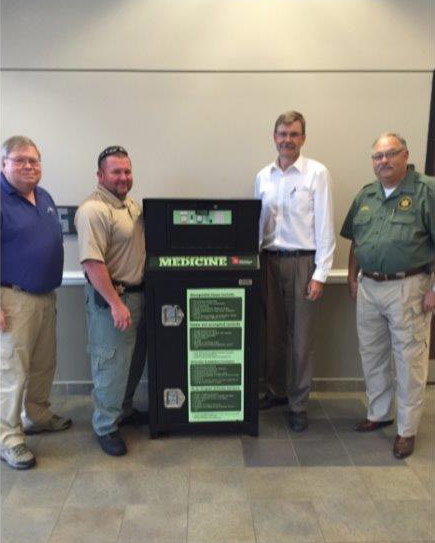Contact Us
To provide feedback on the Community Policing Dispatch, e-mail the editorial board at CPDispatch@usdoj.gov.
To obtain details on COPS Office programs, publications, and resources, contact the COPS Office Response Center at 800-421-6770 or AskCopsRC@usdoj.gov

U.S. Department of Justice
Office of Community Oriented Policing Services
Washington, DC 20530
SAC Thomas Farmer, Tennessee Bureau of Investigations (TBI), is the Director of the Tennessee Dangerous Drugs Task Force. TBI is an FY2015 COPS Anti-Heroin Task Force award.
 Tennessee is a culturally rich state, with equal parts longstanding tradition and modern societal advancements. From the beautiful Appalachian mountains to the rock-and-roll roots of Nashville’s historic music scene, Tennessee possesses a magnetism all its own. Unfortunately, Tennessee has been fighting an overwhelming wave of criminal destruction that has claimed almost 8,000 lives in the past six years. The illegal use of prescription opioids, and their illicit counterparts heroin and fentanyl, has devastated communities small and large throughout the state of Tennessee, causing a surge in illegal drug manufacturing, increasing economic strain, and overwhelming the public health system. As a response to the strain on public resources and the threat to the well-being of all Tennesseans, the Tennessee Dangerous Drugs Task Force (TDDTF) was founded in 1999 with a mission statement dedicated to the cause of reducing the availability and illegal use of DEA-scheduled drugs. The Tennessee Bureau of Investigation (TBI) assumed fiduciary responsibility for the TDDTF in 2006.
Tennessee is a culturally rich state, with equal parts longstanding tradition and modern societal advancements. From the beautiful Appalachian mountains to the rock-and-roll roots of Nashville’s historic music scene, Tennessee possesses a magnetism all its own. Unfortunately, Tennessee has been fighting an overwhelming wave of criminal destruction that has claimed almost 8,000 lives in the past six years. The illegal use of prescription opioids, and their illicit counterparts heroin and fentanyl, has devastated communities small and large throughout the state of Tennessee, causing a surge in illegal drug manufacturing, increasing economic strain, and overwhelming the public health system. As a response to the strain on public resources and the threat to the well-being of all Tennesseans, the Tennessee Dangerous Drugs Task Force (TDDTF) was founded in 1999 with a mission statement dedicated to the cause of reducing the availability and illegal use of DEA-scheduled drugs. The Tennessee Bureau of Investigation (TBI) assumed fiduciary responsibility for the TDDTF in 2006.
We have worked to increase public safety through supplying equipment, training, intelligence, and investigative tools to assist law enforcement and prosecutorial authorities in strategically identifying, targeting, and prosecuting drug offenders. Since receiving funding from the COPS Office under the Anti-Heroin Task Force (AHTF) program, we have been able to continue our work to combat the opioid crisis here in Tennessee. Through this funding, we have created a vital network of law enforcement agencies, regulatory agencies, healthcare providers, treatment providers, and local drug coalitions. The TDDTF Executive Board is made up of commissioners and agency leaders from multiple Tennessee state and local organizations, including the following:
- Tennessee Bureau of Investigation
- Tennessee Department of Children’s Services
- Tennessee Department of Environment and Conservation
- Tennessee Department of Health
- Tennessee Department of Mental Health and Substance Abuse
- Tennessee District Attorneys General and the three Tennessee United States Attorneys
- Tennessee Governor’s Office
- Tennessee Special Agent in Charge of the Drug Enforcement Administration
- Various Tennessee state and local law enforcement agencies
Through the collaboration of these agencies, we have seized 12 clandestine counterfeit pill press labs, established Chronic Pain and Drug Treatment guidelines, and reinforced medical professionals’ compliance with mandatory usage of the Controlled Substance Monitoring Database (CSMD). One of our most measurable achievements has been the creation of the Tennessee Permanent Pill Take Back Program, established in April 2016. As part of our state’s initiative in combating the opioid crises, and in working with our police chiefs, sheriffs, drug task forces, and drug coalitions, the TDDTF and the Tennessee Department of Environment and Conservation (TDEC) have established one of the most effective pill take back programs in the nation. The program deploys TDDTF Incident Response Vehicles and drivers and has a total of 252 collection receptacles, 95 of which have been used to collect more than 162,988 pounds of unused and surrendered pills. Currently, we are considering expanding this program by creating a statewide drug evidence collection program using the same process as the pill take back program. With the efforts of the TDEC and law enforcement partners, and through funding from the COPS Office, we will use the resources and skills already in place for processing, packaging, adulterating, neutralizing, storing, transporting, and destroying hazardous wastes that are generated as evidence.
Although the funding we have received from the COPS Office is vital in helping us continue to fight the opioid crisis here in Tennessee, we have found that a strong emphasis on community policing is the bedrock of our efforts. The TDDTF stands as an excellent example of how well community policing works, through our extensive multidisciplinary and multijurisdictional sharing of resources and information. Through this innovative approach, we have learned how to be flexible with ever-changing drug trends, how to approach problems with a combination of treatments, enforcement, and prevention, and how to establish long-standing relationships, building them early and reinforcing them often. When building these types of relationships, whether at the local or statewide level, law enforcement must be transparent and open. Trust comes when no particular entity is trying to claim a sole victory, but when partners work together. To strengthen these partnerships, the TDDTF regularly meets with public safety and health agencies and law enforcement personnel across the state, engaging all disciplines in training for law enforcement and education of the public on drug-related issues. We have found that presenting all agencies together as a unified front against this crisis is paramount to increasing public safety and health. We are constantly working to balance the employment and enforcement of community policing to protect citizens and drug-endangered children while continuing to address the opioid epidemic.
 We have found that sharing best practices among other local and state agencies is not only beneficial to all agencies involved, but also directly benefits the members of the public. Serving as a pilot study, the TDDTF is currently working with Tennessee Department of Health, the Tennessee Department of Mental Health and Substance Abuse, and the Appalachia High Intensity Drug Trafficking Area (HIDTA) on a national initiative for a Drug Overdose Tracking System through the El Paso Intelligence Center (EPIC). We have built a similar system for Tennessee and are working on sharing this system with EPIC for release in October 2018.
We have found that sharing best practices among other local and state agencies is not only beneficial to all agencies involved, but also directly benefits the members of the public. Serving as a pilot study, the TDDTF is currently working with Tennessee Department of Health, the Tennessee Department of Mental Health and Substance Abuse, and the Appalachia High Intensity Drug Trafficking Area (HIDTA) on a national initiative for a Drug Overdose Tracking System through the El Paso Intelligence Center (EPIC). We have built a similar system for Tennessee and are working on sharing this system with EPIC for release in October 2018.
The resources we have received from the COPS Office have been a crucial element for the TDDTF and the state of Tennessee to address the opioid epidemic and to continue our work within the AHTF program. Our partner and stakeholder agencies are currently using these resources to look at medical alternatives to opioids: identifying the source of the pain or causation and endeavoring to identify concepts for pain management by thinking outside the box. The COPS Office must continue to support multijurisdictional and multidisciplinary state approaches, reinforce collective partnerships, share resources, and emphasize flexibility in order to bring efficiency and effectiveness to a statewide program.
The state of Tennessee, the TDDTF, and dozens of law enforcement and public health agencies are working steadily to fighting our opioid crisis. The safety of our citizens is our number one priority and to maintain that safety we will continue to employ all resources and avenues available to us to eradicate the opioid trade and abuse throughout our communities. We appreciate the assistance that we have received from COPS Office in continuing our mission to protect the citizens of Tennessee and we hope our efforts will serve as an example to other agencies around the country dealing with this epidemic.
SAC Thomas Farmer
Tennessee Bureau of Investigations
Subscribe to Email Updates
To sign up for monthly updates or to access your subscriber preferences, please enter your email address in the Subscribe box.






